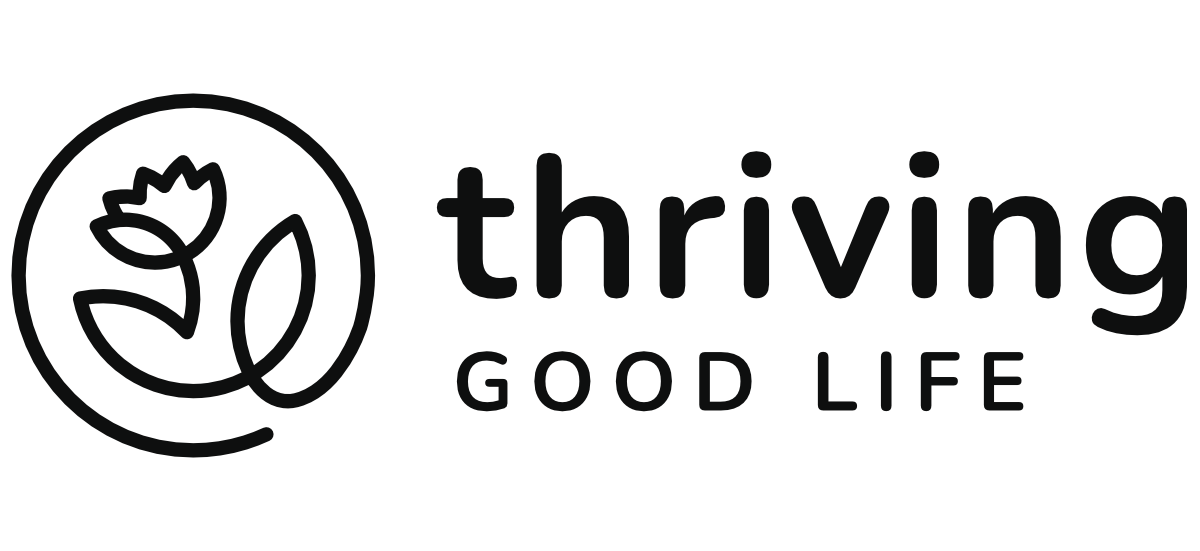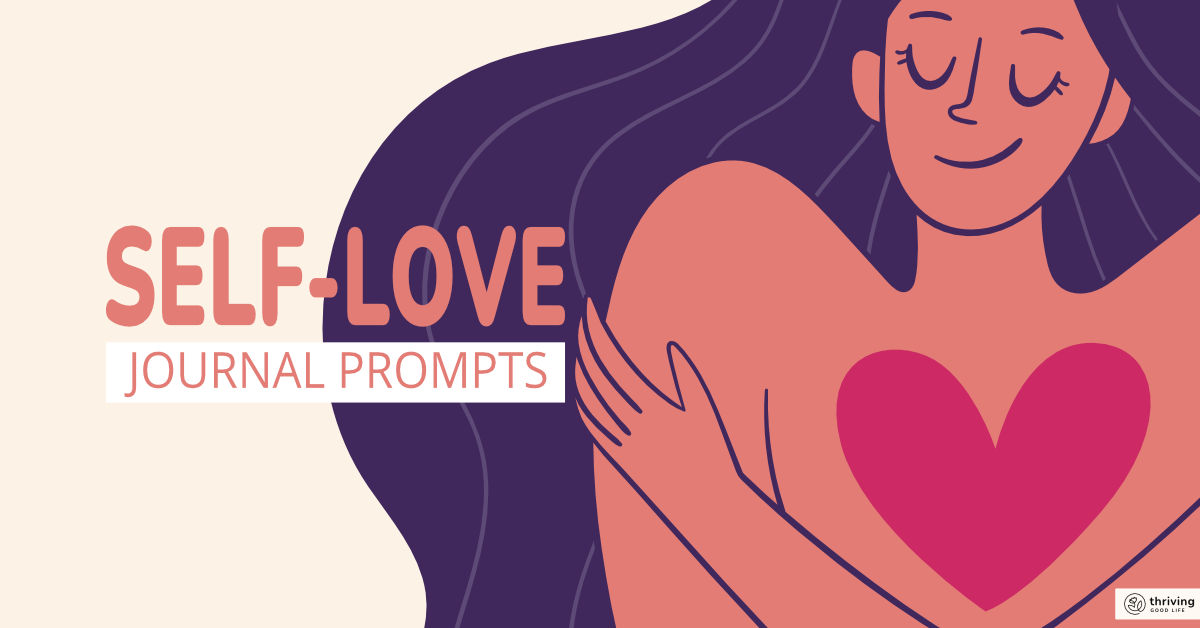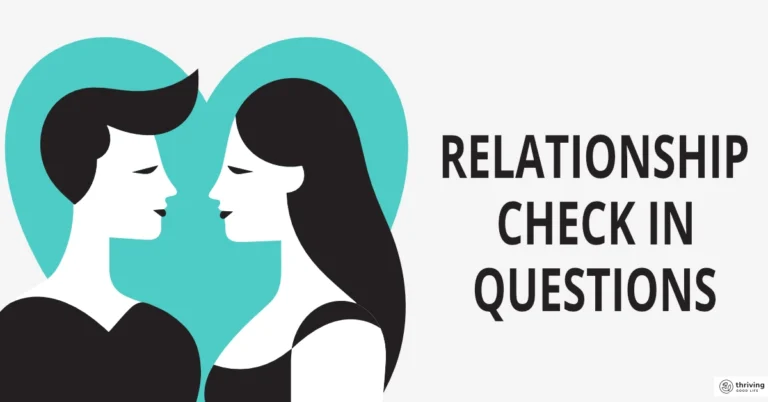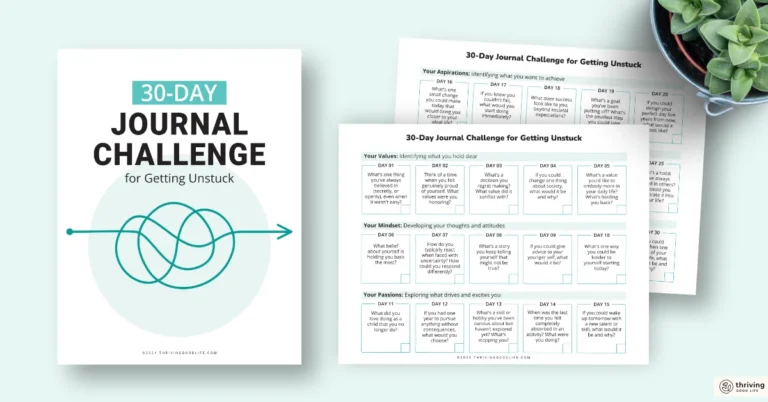🤗 Everyone has the capacity for self-love and acceptance, but it’s not the easiest thing to access. We need to give ourselves extra care and attention. Self-love journal prompts can help.
When we’ve been repeatedly told that we’re not good enough, it’s easy to start believing it.
Negative self-talk creeps in, and any semblance of self-love creeps out. And that rejection of ourselves runs deep. So deep, that when we do things that every other human on the planet does, like… make a mistake, it serves as even more evidence that we’re the worst. Not worthy of love.
When we’re feeling unlovable, we need to find a way to accept ourselves, flaws and all. And journaling is a great tool to help replace self-criticism with self-compassion.
If you’re struggling with negative self-talk, and could really do with being kinder to yourself, these self-love journal prompts are for you. Use them to kickstart your journey toward greater self-love and acceptance.
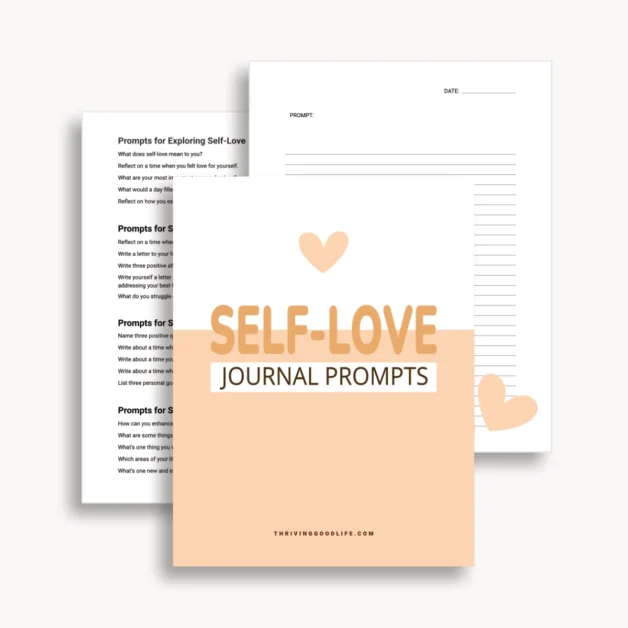
Want these prompts as a printable PDF?
Sign up and I’ll send them to you. Plus you’ll get free access to my library of journaling pages & worksheets, a well as updates and special offers.
By signing up you agree to our T&Cs and Privacy Policy.
How to Use These Self-Love Prompts
Each section lists the prompts as they appear, but if you want extra guidance, keep scrolling to read the information for each prompt. Feel free to copy them into your journal or notebook.
Some of these prompts you’ll find easy, others not so much. Some prompts might even trigger uncomfortable feelings you may not be ready to confront yet. It’s okay to skip the ones that don’t resonate with you, and focus on the ones that feel right.
As you answer these prompts, try to approach them with honesty, kindness, and self-compassion. Be gentle with yourself, and don’t judge yourself for any struggles you may have. Instead, remember to focus on moving forward, by accepting where you’re at today.
Take your time, be patient, and celebrate every step you take.
Got it? Awesome, let’s get started.
Prompts for Exploring Self-Love
- What does self-love mean to you?
- Reflect on a time when you felt love for yourself.
- What are your most important personal values?
- What would a day filled with self-love look like?
- Reflect on how you express self-love to others, and how that makes you feel.
1) What does self-love mean to you?
Self-love means different things to different people. Take a moment to think about what it means to you. What actions or behaviours do you personally associate with loving yourself?
Think about the people in your life or in the media who seem to embody self-love. Who paints that picture of self-love for you? It’s okay if you can’t think of anyone off the top of your head, take some time to reflect on what qualities you admire in others and how they practice self-love.
Also, reflect on what self-love is not.
This can be helpful in identifying patterns or behaviours you want to avoid. For example, negative self-talk, self-criticism, prioritising other people’s needs and opinions over your own, seeking external validation, etc.
2) Reflect on a time when you felt love for yourself.
I know this is a tricky one to answer, but give it a go.
Reflect on any memories or moments in the past when you felt a strong sense of self-acceptance and self-appreciation.
What were you doing? Who were you with? What feelings and emotions did you experience?
3) What are your most important personal values?
Our values shape how we treat and care for ourselves.
As we become more aware of what we value in life, we make deliberate choices that match our beliefs and needs. Which further increases our self-awareness and self-love.
For instance, if trust is a core value for you, you’ll demonstrate self-love by surrounding yourself with people who are trustworthy. You’ll also strive to be a reliable trustworthy person for others.
Similarly, if growth is a fundamental value for you, you’ll prioritise self-improvement and learning as an act of self-love.
💡 Related: What is Self-Awareness? And How to Use it to Improve Your Life and Relationships
4) What would a day filled with self-love look like?
Imagine starting your day with a sense of purpose and positivity.
Think about the activities that would bring you joy and fulfilment. What practices or rituals would help you release any stress or tension, and promote feelings of relaxation and peace?
What actions would you take to fuel and nourish your body?
Which people would you most like to spend time with?
As your day comes to a close, how would you unwind and reflect on your day of self-love?
5) Reflect on how you express self-love to others, and how that makes you feel.
Self-love can be expressed to others in a variety of ways, such as setting healthy boundaries, respecting other people’s time, being a good listener, and keeping your promises.
Reflect on the impact of these expressions of self-love on your relationships in the past. Were they healthy or unhealthy, and how did they affect the people involved?
Are there any situations where you find it difficult to express self-love to others?
What patterns or common triggers do you notice in those situations? What steps can you take to show self-love to others in those moments?
Prompts for Self-Compassion
- Reflect on a time when someone showed you kindness and compassion.
- Write a letter to your future self, offering words of encouragement and self-love.
- Write three positive affirmations to cultivate self-love.
- Write yourself a letter of forgiveness for a mistake you made, but write it as though you were addressing your best friend.
- What do you struggle or have struggled to accept about yourself?
1) Reflect on a time when someone showed you kindness and compassion.
What did it feel like when someone showed you warmth, care, and understanding? What lessons did you learn from how that person treated you? And how can you cultivate similar qualities so you can show that level of kindness and compassion to yourself and others?
2) Write a letter to your future self, offering words of encouragement and self-love.
Imagine yourself ten years from now. Imagine the person you’ve become and all the amazing things you’ve accomplished. It’s important to remember that the journey wasn’t easy, but you persevered through the challenges and emerged stronger and wiser.
Now, take a moment to write a letter to your future self. In this letter, offer words of encouragement and self-love. Remind yourself of the incredible things you’ve achieved and the person you’ve become. Be proud of yourself and all that you’ve accomplished.
What lessons have you learned along the way? What guidance and support does the future you need? Think about what you would like to remind yourself of when you read this letter in the future. What would you like to tell yourself? What words of encouragement would you need to hear?
💡 Related: How to Build a Brighter Future with Future Self Journaling
3) Write three positive affirmations that you can repeat to yourself to cultivate self-love.
Think about what areas of your life you may struggle with when it comes to self-love. Do you find it difficult to accept compliments? Are you often self-critical? Do you struggle with feelings of unworthiness?
Once you’ve identified areas you’d like to improve, try coming up with affirmations or positive statements that specifically target those areas. For example, if you struggle with accepting compliments, your affirmation could be something like this:
“I’m actively working on embracing my self-worth and learning to accept genuine compliments with gratitude and grace”.
The key to an effective affirmation is to make it around something that’s authentic and meaningful to you. And then, repeat them to yourself often.
4) Write yourself a letter of forgiveness for a mistake you made, but write it as though you were addressing your best friend.
It’s completely normal to make mistakes and experience feelings of regret or guilt. It’s also okay to acknowledge your imperfections and take responsibility for any pain you may have caused. But it’s also important to practice self-compassion and not dwell on these mistakes for too long.
Imagine it was a friend who had made the mistake. They’ve taken responsibility for it, but are feeling terribly guilty. What would you write in your letter?
What words of support and reassurance would you offer? How would you help them recognise and focus on their strengths, growth, and admirable qualities?
If you’re not sure, you can steal this template. It’s a pretty simplistic letter, but use this as a starting point. Make it relevant to your situation and include as much detail as you can:
Hey [Your Name], I know you're feeling really bad about [whatever the mistake was]. Trust me, I get it. It's not easy to just forget it happened, especially with everything else you've got going on at the moment. But I want you to know that I'm here for you. I don't blame or judge you for the mistake. Everyone messes up. What's that thing your aunt Nellie is always saying: 'we're perfectly, imperfect beings just trying to do the best we can with the tools we have'. I mean, you're witness to my many indiscretions and somehow you're still friends with my goofy ass lol. Girl, I love you for never judging or blaming me. And the way you stepped up, and took responsibility straight away... just wow. That takes a lot of courage. You're amazing, I hope you can see that. And I hope you can see that it's not worth blaming yourself for this. It happened, yeah. But we can't go back an fix the past, so somehow we've just got to move forward. I know it's hard, but I know (knowing you) that you'll find a way to forgive yourself and accept that this was just one of those things. That will come, in time - I promise you. 'This too shall pass'. Remember :) And when it does pass, we'll look back at this time and see how far we've come. So keep your chin up, my darling. Here for you always. Much love [Your Best Friend's Name]
5) What do you struggle or have struggled to accept about yourself?
Take a moment to consider any traits or behaviours you find difficult to accept about yourself. It could be a minor habit or a significant personal belief. Once you’ve identified what it is, try to examine why you struggle to accept it. Is it because of external influences such as societal expectations or personal experiences, or is it something internal like negative thoughts?
Also, pay attention to thoughts, emotions, or feelings that come up as you answer the prompt. Do you notice any physical sensations in your body? Where?
Remember that struggling to accept certain parts of ourselves is a normal part of being human.
Prompts for Self-Praise and Recognition
- Name three positive qualities you appreciate about yourself.
- Write about a time you handled a difficult situation or challenge with grace.
- Write about a time you listened to your instincts and it led to a positive outcome.
- Write about a time when you took a risk (and that risk paid off).
- List three personal goals that you’ve achieved and how you feel about this success.
1) Name three positive qualities you appreciate about yourself.
Naming positive qualities about ourselves can sometimes be challenging. We often focus on our flaws and shortcomings, rather than recognising our strengths and attributes. But it’s important to practice self-appreciation and acknowledge our gifts.
So, when thinking about this prompt, take a moment to reflect on what you like about yourself. Think about the characteristics that make you unique and special. These can be physical features, personality traits, skills, or even habits.
What do your friends and family appreciate about you? What are you most complimented on? What was the last piece of positive feedback you received?
2) Write about a time when you handled a difficult situation or challenge with grace and positivity.
This could be something as simple as a miscommunication with a friend, or something more complex like a difficult work project.
Detail all aspects of the problem. What were the circumstances? Who was involved? What emotions were you feeling at the time?
Write about how you responded to the situation. What actions did you take? How did you communicate with others involved? What mindset did you adopt?
Now think about the positive outcomes that came from handling the situation. How have you grown from that experience? What or who did you have to let go of, and how did this improve your life? What can you celebrate about your triumph over this challenge?
3) Write about a time when you listened to your instincts and it led to a positive outcome.
What have your instincts got to do with self-love? Everything. When you follow your instincts you’re trusting yourself to make better decisions and avoid harmful situations. Ultimately, you’re choosing to protect and prioritise your well-being.
So think back to a situation where you had a gut feeling about something. Maybe it was a decision related to your career, relationships, or health. What did your instincts tell you? Write about any resistance or doubts you may have had initially. What were you most grateful for?
4) Write about a time when you took a risk (and that risk paid off).
Nothing will boost your self-confidence more, than taking calculated risks and winning.
When you step outside of your comfort zone and push yourself to try something new, you’re showing yourself that you’re capable of growth and progress. That you believe in your own strengths and abilities to accomplish something that feels bigger than you.
Reflect on a time when you took a risk and it paid off.
Maybe you took a risk by applying for a job you weren’t sure you were qualified for but ended up getting hired and excelling in your role. Perhaps you took a chance on a new relationship and it turned out to be the best decision you ever made. How did taking this leap of faith make you feel? What did you learn about yourself in the process?
5) List three personal goals that you’ve achieved and how you feel about this success.
These goals can be big or small, short-term or long-term.
What steps did you take to achieve them? What obstacles or challenges did you have to overcome along the way? How did you feel when you reached each goal?
💡 Related: 50+ Gratitude Journal Prompts to Make You Feel Better, Even on Crappy Days
Prompts for Setting Self-Love Intentions
- How can you enhance the relationship you have with yourself?
- What are some things you can do to respect your feelings and needs this week?
- One thing you will do today to show yourself more self-compassion and kindness?
- Which areas of your life do you need to establish stronger boundaries?
- What’s one new and exciting thing you’d love to do in the future?
1) How can you enhance the relationship you have with yourself? Identify three areas you’d like to improve.
Think about how you currently relate to yourself. What unhealthy habits or thought patterns are not serving you? Overworking, not seeking help, not taking care of your mental or physical health, etc.
Use your journal to brainstorm ways you can make changes that promote a healthier, happier relationship with yourself. Why are these changes important to you? How will your life improve as a result of making these changes, and how do you plan to integrate these changes into your life?
2) What are some things you can do to respect your feelings and needs this week?
It’s important to pay attention to your feelings and acknowledge what you need in order to feel nourished and supported. Is it rest? Connection with loved ones? Time in nature. Or something else entirely? Write these down.
Then explore what you need to do to get these needs met. That could be scheduling more ‘me’ time to plan self-care activities, or reaching out to a supportive friend if you’re struggling with something.
3) What’s one thing you will do today to show yourself more self-compassion and kindness?
This doesn’t have to be some big, grand gesture.
Maybe it’s saying something nice to yourself when you look in the mirror. Or acknowledging the fact you cleaned the house today. Maybe it’s taking a walk and listening to some music that makes you feel good about yourself.
How will you celebrate this one thing?
4) Which areas of your life do you need to establish stronger boundaries and assert yourself more?
It’s easy to lose sight of our own well-being when we’re constantly saying yes to others. But setting healthy boundaries is essential for protecting our physical, emotional, spiritual, and mental health.
Take a moment to think about the different aspects of your life, like relationships, work, social activities, and personal time. Have you noticed areas where you’re lacking boundaries?
Do you often find yourself agreeing to things when you really want to say no? Do you allow others to take advantage of your time or resources? Are there people in your life who consistently disrespect your boundaries?
Reflect on these questions and identify specific areas in your life where you could benefit from asserting yourself more. Once you’ve identified these areas, think about how you can communicate your boundaries in a clear and confident way, and what actions you can take to enforce them.
5) What’s one new and exciting thing you’d love to do in the future?
Have you ever caught yourself daydreaming about something new and exciting that you’d love to do? Maybe it’s a hobby that you’ve always been interested in, a sport you’ve been curious about, or an adventure you’d love to embark on. Whatever it may be, take some time to reflect on your interests and passions, and consider what it is that really speaks to you.
What’s been stopping you from turning that dream into a reality? Is it a lack of time, resources, or support? Or maybe fear and anxiety have been holding you back.
How can you overcome obstacles preventing you from making that one thing a reality?
— Did You Find This Article Helpful? Pin it for Later —
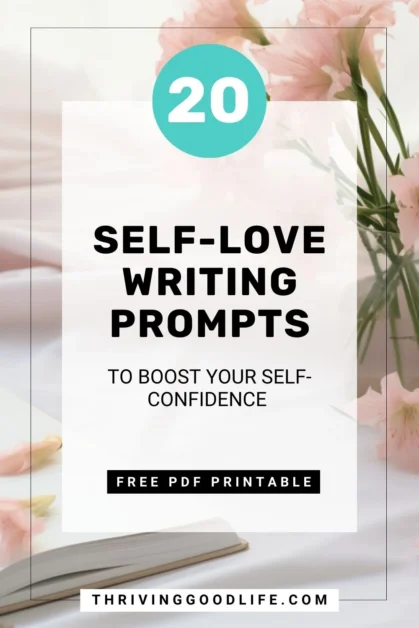


Want these prompts as a printable PDF?
Sign up and I’ll send them to you. Plus you’ll get free access to my library of journaling pages & worksheets, a well as updates and special offers.
By signing up you agree to our T&Cs and Privacy Policy.
